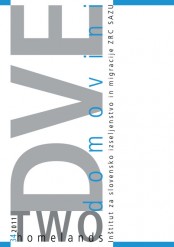Mednarodne posvojitve in migracije: Presečišča in izzivi. Primer Slovenije
Ključne besede:
mednarodne posvojitve, sorodstvene vezi, migranti, nacionalnost, identitetaPovzetek
Avtorica v prispevku raziskuje položaj mednarodno posvojenih otrok v državi, v katero so bili posvo- jeni. Z raziskovanjem načinov, na katere posamezenik postane del določene nacionalne skupnosti in/ ali kulture, s povzemanjem raziskav na področju mednarodnih posvojitev in etnizacije kot tudi možnih strategij za ravnanje dokazuje, da pripisana pripadnost zahteva več kot le državljanski status ali pravno legalizirane sorodstvene vezi.
Prenosi
Literatura
Balibar, Étienne (1988). Racism and Nationalism. Race, Nation, and Class: Ambiguous Identities (ed. Étienne Balibar and Immanuel Wallerstein). London: Verso, 37-67.
Bell, Avril (2010). Being ‘at home’ in the nation: Hospitality and sovereignty in talk about immigration. Ethnicities 10(29): 236-256.
Bergquist, Kathleen Ja Sook (2009). Operation Babylift of Babyabduction? : Implications of the Hague Convention on the humanitarian evacuation and ‚rescue‘ of children. International Social Work 52(5): 621-633.
Berking, Helmuth (2003). ‚Ethnicity is Everywhere‘: On Globalization and the Transformation of Cultural Identity. Current Sociology 51(3-4): 248-264.
Cross, William E. (1987). A Two-factor Theory of Black Identity: Implications for the Study of Identity Development in Minority Children, Children’s Ethnic Socialization: Pluralism and Development (ed. Jean S. Phinney, Mary Jane Rotheram). Thousand Oaks, CA: Sage Publications, 117-133.
Dorow, Sara (2006). Racialized Choices: Chinese Adoption and the ‚White Noise‘ of Blackness. Critical Sociology 32(2-3): 357-379.
Dubinsky, Karen (2008).The fantasy of the global cabbage patch. Making sense of transnational adoption. Feminist theory 9(3): 339-345.
Friedlander, Myrna L., Lucille C. Larney, Marianne Skau, Marcus Hotaling, Marsha L. Cutting, and Michelle Schwam (2000). Bicultural identifi cation: Experiences of internationally adopted children and their parents. Journal of Counseling Psychology 47: 187-198.
Hjern, Anders, Frank Lindblad, and Bo Vinnerljung (2002). Suicide, psychiatric illness, and social maladjustment in intercountry adoptees in Sweden: A cohort study. The Lancet 360(9331): 443-448.
Huh, Nam Soon and William J. Reid (2000). Intercountry, transracial adoption and ethnic identity: A Korean example. International Social Work 43(1): 75-87.
Jenkins, Richard (2000). Categorization: Identity, Social Process and Epistemology. Current Sociology 48(3): 7-25.
Lammerant, Isabelle and Marlene Hofstetter (ed.) (2007). Adoption: at what cost? For an ethical responsibility of receiving countries in intercountry adoption. Lausanne: Terre des homes – child relief.
Laubjerg, Merete, Anne Maj Christensen and Birgit Petersson (2009). Psychiatric status among stepchildren and domestic and international adoptees in Denmark. A comparative nationwide registerbased study. Scandinavian Journal of Public Health 37(6): 604 – 612.
Lee, Richard M. (2003). The transracial adoption paradox: History, research, and counselling implications of cultural socialization. The Counseling Psychologist 31(6): 711-744.
Leinaweaver, Jessica B. and Claudia Fonseca (2007). The State and Children‘s Fate: Reproduction in Traumatic times. Childhood 14(3): 291-229.
Misztal, Barbara A. (2010). Collective Memory in a Global Age: Learning How and What to Remember. Current Sociology 58(1): 24-44.
Schinkel, Willem (2010). The Virtualization of Citizenship. Critical Sociology 36(2): 265-283.
Schuerkens, Ulrike (2005). Transnational Migrations and Social Transformations: A Theoretical Perspective. Current Sociology 53(4): 535-553.
Scroggs, Patricia and Heather Heitfi eld (2001). International adopters and their children: Birth culture ties. Gender Issues 19(4): 3-30.
Thomas, Kristy A. and Richard C. Tessler (2007). Bicultural Socialization Among Adoptive Families: Where There is a Will, There Is a Way. Journal of Family Issues 28(9): 1189-1219.
Zaviršek, Darja (2009). Med krvjo in skrbjo: socialno starševstvo kot širitev koncepta starševstva v današnjem svetu. Socialno delo 48(1-3): 3-16.
Zaviršek, Darja, Vesna Leskošek, Mojca Urek, Špela Urh, Ana M. Sobočan, Tanja Mastnak, Barbara Goričan, Irena Rezar, Maja Klun and Natalija Jeseničnik (2008). Socialno starševstvo kot ključni vidik sodobnih družinskih politik : končno poročilo o opravljenem projektu. Ljubljana: Mestna občina Ljubljana, Fakulteta za socialno delo.
Zaviršek, Darja, Barbara Kobal Tomc, Gabi Čačinovič Vogrinčič, Špela Urh, Ana M. Sobočan, Simona Smolej, Polona Dremelj, Vid Žiberna, Maja Klun and Irena Rezar (2009). Postopki, organizacija in standardi na področju posvojitev: raziskovalno poročilo. Ljubljana: Fakulteta za socialno delo, Inštitut RS za socialno varstvo.
Zemostny, Kathy P., Karen M. O‘Brien, Amanda L. Baden and Mary O‘Leary Wiley (2003). The Practice of Adoption: History, Trends and Social Context. The Counselling Psychologist 31(6): 651-678.
Zerubavel, Eviatar (1997). Social Mindscape: An Invitation to Cognitive Sociology. Cambridge, MA: Harvard University Press.
Prenosi
Objavljeno
Kako citirati
Številka
Rubrike
Licenca

To delo je licencirano pod Creative Commons Priznanje avtorstva-Nekomercialno-Brez predelav 4.0 mednarodno licenco.
Avtorji jamčijo, da je delo njihova avtorska stvaritev, da v njem niso kršene avtorske pravice tretjih oseb ali kake druge pravice. V primeru zahtevkov tretjih oseb se avtorji zavezujejo, da bodo varovali interese založnika ter da bodo povrnili morebitno škodo.
Podrobneje v rubriki: Prispevki





